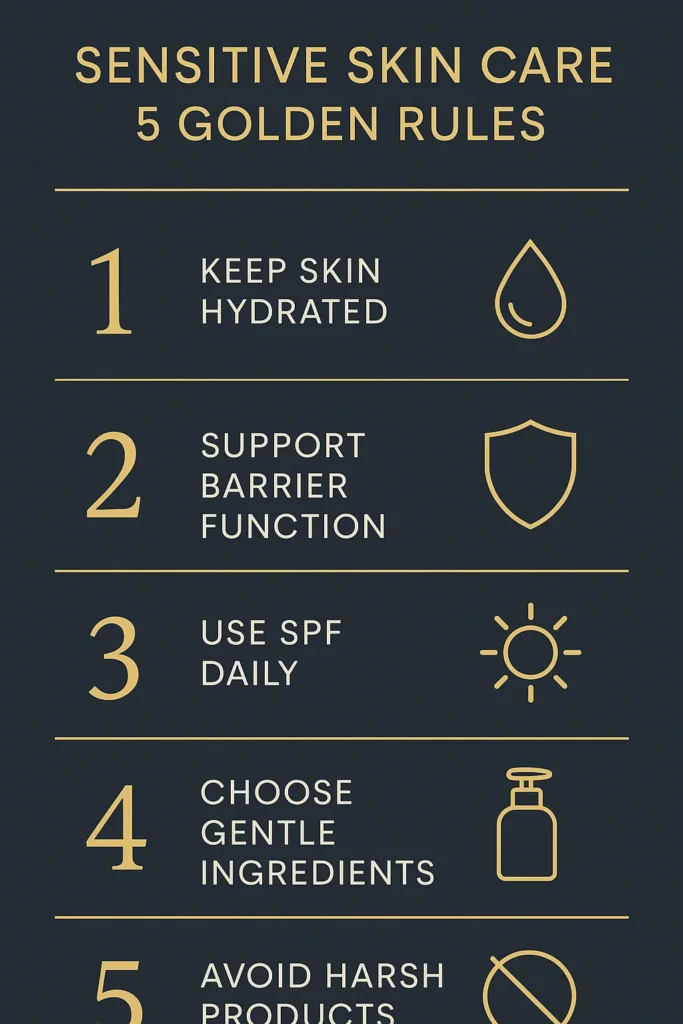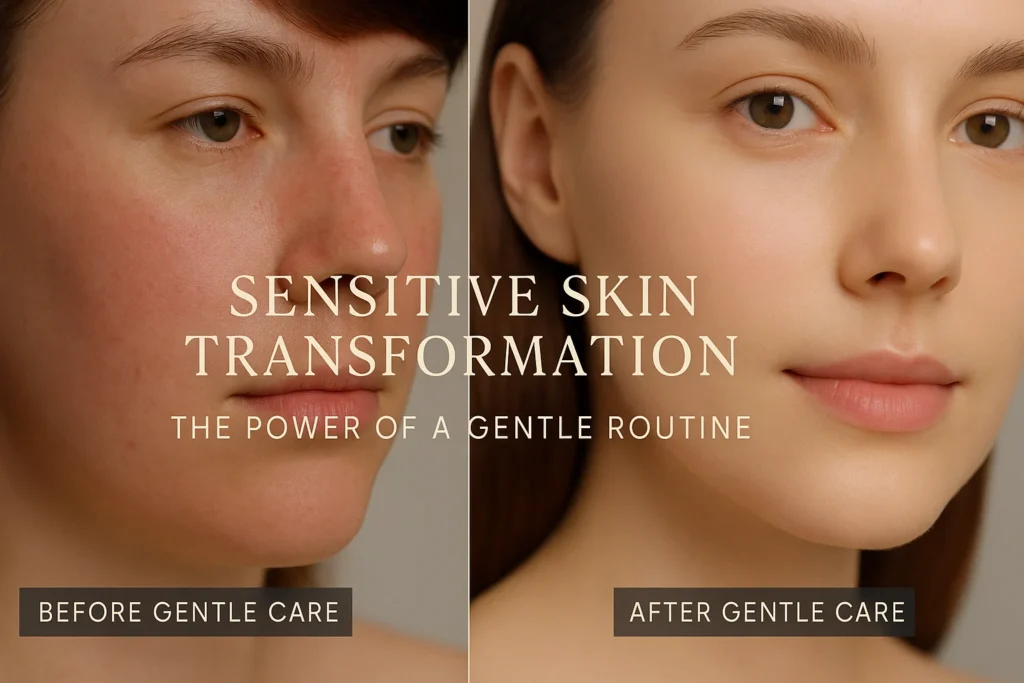Sensitive skin reacts easily with redness, itching, or dryness. A good sensitive skin care routine helps keep your skin calm and healthy.
In a Nutshell: Sensitive Skin Care Routine Tips and Tricks
- You will learn gentle steps for daily skin care.
- You will find out which products and ingredients are best.
- You will understand how to protect your skin barrier.
Estimated reading time: 7 minutes
Having sensitive skin can be tough. Your skin might feel tight, burn, or turn red from many things. This guide helps you build a simple, effective routine. It focuses on gentle care and protecting your skin.
Understanding Sensitive Skin
Sensitive skin often has a weak skin barrier. This makes it easily bothered by harsh ingredients or weather. In 2025, experts focus on fixing this barrier. They also aim to calm redness and keep skin hydrated. You want to avoid things that cause irritation. Supporting your skin’s natural good bacteria, called the microbiome, is also key.

Your Daily Sensitive Skin Care Routine
Follow these steps for calm, healthy skin.
Step 1: Gentle Cleansing
Start with a gentle cleanser. This removes makeup, sunscreen, and dirt without stripping your skin.
- Use an oil-based cleanser or balm first. It breaks down makeup well.
- Then, use a sulfate-free cleanser made for sensitive skin.
- Always use lukewarm water. Hot water can make your skin more sensitive.
- Do not use harsh scrubs or cleansers that exfoliate.
- Cleanse your face twice a day. Cleaning too much can harm your skin.
Step 2: pH Rebalancing with Toners
After washing, use a hydrating toner. This helps bring your skin’s natural pH back to normal.
- Choose toners without alcohol or strong chemicals.
- Look for toners with plant waters like rose or chamomile. They soothe your skin.
- Apply products when your skin is a little damp. This helps them soak in better.
Step 3: Nourish and Repair Your Skin Barrier
Next, add moisture and protection.
- Use a hydrating essence. This is a light layer of moisture.
- Apply a soothing moisturizer that supports your skin’s microbiome.
- Look for ingredients like:
- Prebiotics and postbiotics: These help your skin’s good bacteria.
- Squalane: A light oil that feels like your skin’s natural oils. It will not clog pores.
- Organic Aloe Vera: This calms and reduces redness.
- Acmella Flower Extract: Helps with aging and soothing.
- Hydrolyzed Pea Protein: Makes skin stronger.
- Avoid moisturizers with fake smells, alcohol, or strong ingredients.
Step 4: Targeted Treatments
If you need more help, use special serums.
- Choose serums with gentle, barrier-repairing ingredients. Good choices are niacinamide (in small amounts) and ceramides. Antioxidants also help.
- Talk to a skin doctor before using strong ingredients like retinol or acids. These can be too harsh for sensitive skin.
Step 5: Sun Protection
Sunscreen is a must every day.
- Use a broad-spectrum sunscreen with SPF 30 or higher. Wear it even on cloudy days.
- Pick sunscreens made for sensitive skin. Mineral sunscreens (with zinc oxide or titanium dioxide) are often best. They cause less irritation.
- Reapply sunscreen every two hours if you are outside. This keeps you protected. Learn more about sun protection here.
More Tips for Sensitive Skin
These habits help your skin stay calm.
- Drink Water: Stay hydrated from the inside. This helps your skin too.
- Avoid Bad Products: Do not use sulfates, harsh soaps, or alcohol-based toners.
- Patch Test: Always try new products on a small skin area first. Wait a day to see if you react.
- Gentle Makeup: Use less makeup or choose gentle kinds. Always remove it carefully.
- Manage Stress: Stress can make skin sensitive. Try to relax.
- Control Temperature: Avoid very hot or very cold water.
- See a Doctor: A skin doctor can give you specific advice. They can help tailor treatments for your needs.
Is Your Routine Sensitive Skin Friendly?
Science Behind Sensitive Skin Care
New research helps us understand sensitive skin better.
Skin Barrier and Microbiome
In 2025, we know more about the skin’s microbiome. This is the group of good bacteria on your skin.
- Ingredients like postbiotics, prebiotics, and gentle plant extracts help rebuild this barrier. They also reduce skin flare-ups.
Soothing Ingredients
Certain ingredients calm sensitive skin.
- Aloe Vera quickly soothes and reduces inflammation.
- Chamomile, Calendula, and Oat Extracts calm redness.
- Niacinamide can strengthen the skin barrier and reduce redness. Use it carefully.
- Squalane moisturizes without clogging pores or causing irritation.
- Avoid harsh things like alcohol, fake smells, and strong acids.
Common Mistakes to Avoid
Do not make these errors with sensitive skin:
- Scrubbing your face too hard.
- Trying many new products at once.
- Washing your face with hot water.
- Forgetting sunscreen or using bad sunscreens.
- Washing or moisturizing too much.
- Not testing new products first.
- Simplify Your Routine: Use fewer products. Each new product is a chance for irritation.
- Read Labels Carefully: Look for “fragrance-free” and “hypoallergenic.” Avoid alcohol and sulfates.
- Be Gentle: Do not rub or scrub your skin. Pat dry instead of wiping.
- Moisturize Often: Keep your skin barrier strong with a good, simple moisturizer.
- Protect from Sun: Daily sunscreen is your best friend against irritation and damage.
Popular Products for Sensitive Skin

Many products are made for sensitive skin. Here are a few examples:
- Mokosh Organic Makeup Remover & Cleansing Oil: This gentle oil removes makeup. It is botanical and free of essential oils.
- Fitglow Calm Cleanser: A creamy cleanser with peptides. It soothes and protects.
- Soothe and Protect Moisturiser: This light moisturizer has prebiotics. It is safe for reactive skin.
- 100% Pure Restorative Sea Culture Hydrate Toner: A mineral-rich toner. It hydrates and balances skin pH.
Conclusion
Taking care of sensitive skin means being gentle and smart. Focus on simple steps, good ingredients, and protecting your skin. This helps your skin stay calm and healthy for a long time.
Your Questions About Sensitive Skin Care Answered (Simply)
What is the best routine for sensitive skin?
What ingredients should I avoid with sensitive skin?
How often should I cleanse sensitive skin?
Is sunscreen important for sensitive skin?
Can diet affect sensitive skin?
What is a skin barrier and why is it important?
Should I patch test new products?
- Clinically proven to reduce dark spots
- Safe, non-irritating botanical formula
- Visible results in just 2 weeks
- Deeply moisturizes all day long
- Boosts skin’s natural hydration barrier
- Lightweight, non-greasy texture
- Increases firmness and elasticity
- Minimizes fine lines & wrinkles
- Dermatologist-approved formula
- Targets old & new stretch marks
- Derm-tested for sensitive skin
- Results in as little as 4 weeks
- Soothes inflammation immediately
- Reduces flare-ups over time
- Fragrance-free & non-comedogenic
- Powered by collagen-boosting peptides
- Improves skin tone & texture
- For all skin types, even sensitive
- Improves scar texture & appearance
- Clinically tested on keloids
- Feel smoother, look renewed




